Modular Bamboo Market Research, 2032
The global modular bamboo market was valued at $1.2 billion in 2022, and is projected to reach $1.8 billion by 2032, growing at a CAGR of 4.6% from 2023 to 2032.
KEY HIGHLIGHTERS
- The modular bamboo market has been analyzed in value. The value of the modular bamboo market is analyzed in millions.
- The major players operating in the industry include Moso International BV, Fujian HeQiChang Bamboo Product Co., Ltd., Bali Prefab World, Smith & Fong Company, Anji Tiazhen Bamboo Flooring CO. LTD, BambuBuild, Bamboo Revolution, EcoPlanet Bamboo Group, Cali Bamboo, and Teragren. These players have adopted product launch as their key strategy to increase their market shares.
- Included more than 20 countries in the report which covers market volume as well as market value for all the countries of modular bamboo market.
- Covered the detailed list of manufacturers by application of modular bamboo market. It covers the product information, application, and geographical presence of the companies.
- Conducted primary interviews with raw material suppliers, wholesalers, suppliers, and manufacturers of modular bamboo market to understand the market trends, growth factors, pricing, and key players competitive strategies.
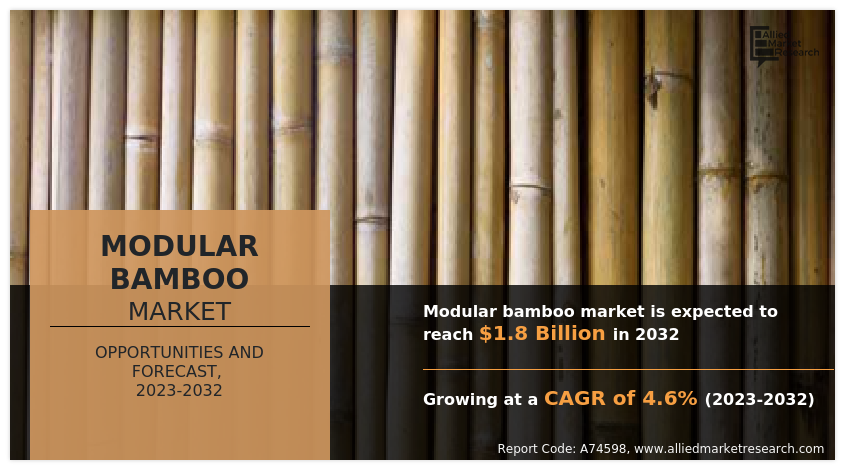
Modular bamboo refers to a construction technique that involves using bamboo as a building material to create modular structures. In this technique, bamboo is cut into standardized sizes and shapes, which can be easily joined together to form a variety of structures such as homes, offices, and even furniture.
Modular bamboo structures have become increasingly popular due to their sustainability and eco-friendliness, as bamboo is a fast-growing, renewable, and biodegradable material. In addition, bamboo is strong, lightweight, and has a high tensile strength, making it a suitable alternative to traditional construction materials such as concrete and steel. Modular bamboo structures can be designed to withstand earthquakes and other natural disasters, as bamboo is highly flexible and can absorb shock. Furthermore, bamboo is a highly versatile material that can be used in a variety of ways, such as flooring, walls, roofs, and even furniture.
The global modular bamboo market is driven by an increase in focus on sustainable and eco-friendly building materials. Bamboo has gained popularity as a renewable and biodegradable alternative to traditional building materials like concrete and steel. Modular bamboo structures can be built with minimal impact on the environment, and bamboo can be harvested and regrown much faster than most other building materials.
Bamboo is a relatively inexpensive building material compared to other options such as wood or steel. In addition, modular construction techniques allow faster and more efficient construction, which can lower costs further. Furthermore, bamboo is a highly versatile material that can be used for a wide variety of applications, including flooring, walls, roofing, and even furniture. With modular bamboo structures, the flexibility extends to the design and configuration of the structures themselves, which can be easily customized and reconfigured as needed. Thus, these factors are expected to drive the market growth during the forecast period.
However, changes in the regulatory environment and low consumer awareness inhibit the development owing to the price-sensitive nature of this market. As the price of modular bamboo is relatively higher compared to its traditional counterparts, the usage is limited in developing countries. Moreover, the emerging economies are expected to lead the modular bamboo market in coming years. In addition, a rise in awareness regarding energy conservation and sustainability in the construction industry is expected to benefit the modular bamboo industry.
Growth in Investments in Infrastructure Development
Surge in investments in infrastructure development refers to increased funding and resources allocated toward the planning, construction, and improvement of infrastructure systems within a country or region. Infrastructure investments have a significant impact on economic growth. By improving transportation networks, energy systems, water supply, and communication infrastructure, it becomes easier to conduct business, attract investments, and stimulate economic activity. Improved infrastructure can lead to increased productivity, efficiency, and competitiveness, benefiting both businesses and individuals.
Infrastructure development enhances connectivity by improving transportation networks, such as roads, bridges, railways, ports, and airports. This enables better mobility of goods, services, and people, facilitating trade, tourism, and overall regional development. Improved connectivity reduces travel time, congestion, and transportation costs, leading to increased efficiency and convenience for businesses and individuals.
Furthermore, governments play a crucial role in infrastructure development by setting policies, providing funding, and promoting sustainable practices. If governments prioritize sustainable and eco-friendly construction methods, such as modular bamboo, through incentives and regulations, it can boost the adoption of bamboo-based construction solutions. Moreover, infrastructure development projects require a significant amount of construction materials. With growing investments, an increased demand for sustainable and cost-effective building materials such as modular bamboo is expected. This increased demand can create opportunities for the modular bamboo market to expand and grow.
The modular bamboo market is segmented on the basis of product type, application, end-use industry, and region. By product type, the market is classified into panels, beams, boards, and others. By application, the market is fragmented into flooring, ceilings, furniture and others. By end-use industry, the market is fragmented into residential, commercial and industrial. By region, the market is analyzed across North America, Europe, Asia-Pacific, and LAMEA.
The major players operating in the industry include Moso International BV, Fujian HeQiChang Bamboo Product Co., Ltd., Bali Prefab World, Smith & Fong Company, Anji Tiazhen Bamboo Flooring CO. LTD, BambuBuild, Bamboo Revolution, EcoPlanet Bamboo Group, Cali Bamboo, and Teragren. These players have adopted product launch as their key strategy to increase their market shares.
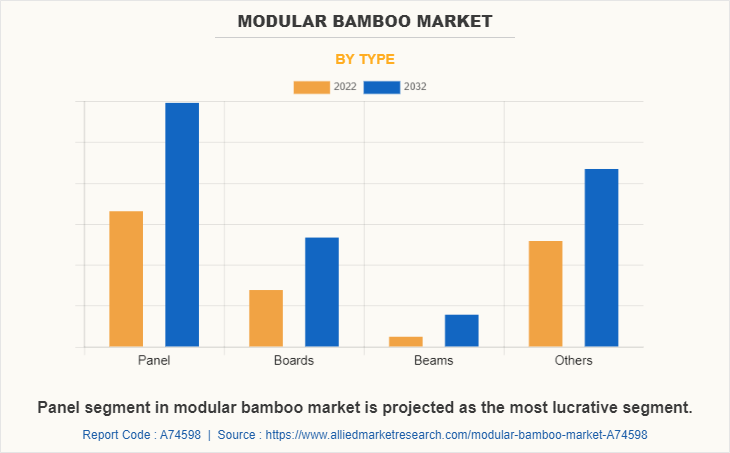
Based on type, the panel segment accounted for the largest share in 2022, contributing to two-fifths of the global modular bamboo market revenue, and is projected to register the highest CAGR of 5% during the forecast period. One of the main growth factors is the increasing popularity and demand for modular bamboo. Moreover, there is a surge in global emphasis on sustainable construction practices and the use of environmentally friendly materials.
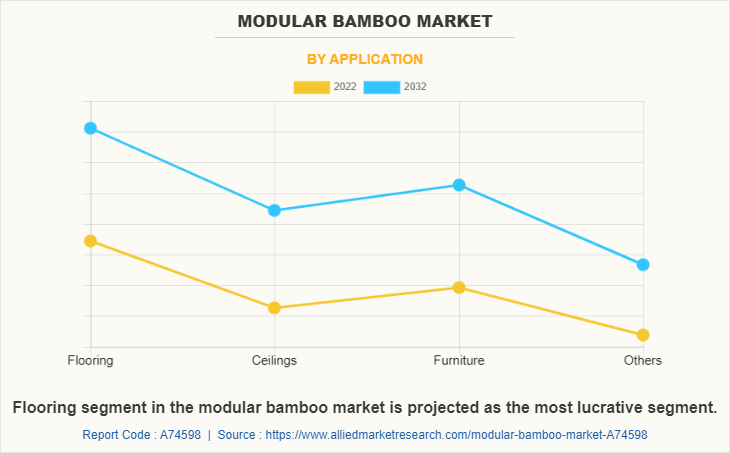
Based on the application, the flooring segment accounted for the largest share in 2022, contributing to around one-third of the global modular bamboo market revenue. Bamboo flooring is available in different formats, including solid bamboo planks, engineered bamboo, and strand-woven bamboo. It can be installed using various methods such as nail-down, glue-down, or floating installations. This versatility allows flexibility in application, making it suitable for different rooms and environments. However, ceilings segment is anticipated to register the highest CAGR of 5% during the forecast period.
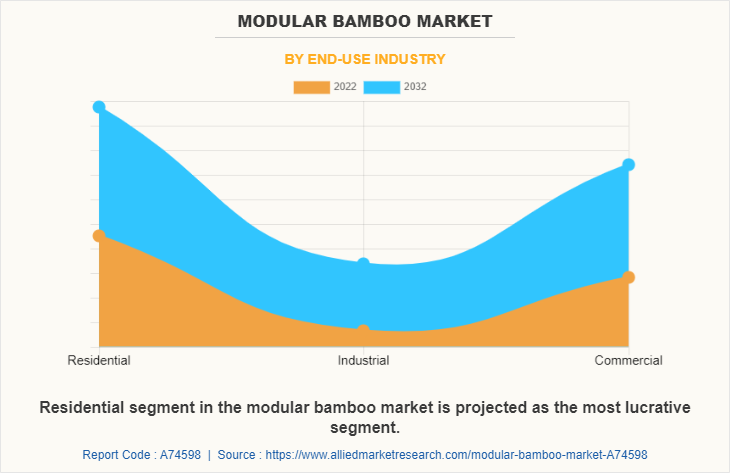
Based on end-use industry, the residential segment held the highest market share in 2022, accounting for more than two-fifths of the global modular bamboo market revenue. Bamboo is used for kitchen and bathroom cabinets, as well as other millwork applications. It provides a stylish and sustainable alternative to traditional wood materials. Bamboo cabinets and millwork can be customized to fit different design styles and offer a durable and long-lasting solution. However, the commercial segments is anticipated to register the highest CAGR of 4.8% during the forecast period.
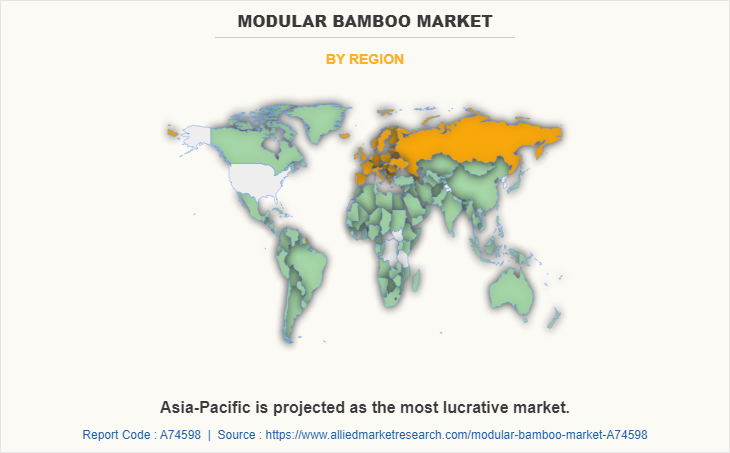
Based on region, Asia-Pacific held the highest market share in terms of revenue in 2022, accounting for more than two-fifths of the global modular bamboo market and is anticipated to register the highest CAGR of 4.8% during the forecast period. The Asia-Pacific modular bamboo market has been driven by several factors, including the abundant availability of bamboo resources, the region's rich bamboo craftsmanship and heritage, and the growing demand for sustainable construction materials.
Key Benefits For Stakeholders
- This report provides a quantitative analysis of the market segments, current trends, estimations, and dynamics of the modular bamboo market analysis from 2022 to 2032 to identify the prevailing modular bamboo market opportunities.
- The market research is offered along with information related to key drivers, restraints, and opportunities.
- Porter's five forces analysis highlights the potency of buyers and suppliers to enable stakeholders make profit-oriented business decisions and strengthen their supplier-buyer network.
- In-depth analysis of the modular bamboo market segmentation assists to determine the prevailing market opportunities.
- Major countries in each region are mapped according to their revenue contribution to the global market.
- Market player positioning facilitates benchmarking and provides a clear understanding of the present position of the market players.
- The report includes the analysis of the regional as well as global modular bamboo market trends, key players, market segments, application areas, and market growth strategies.
Modular bamboo Market Report Highlights
| Aspects | Details |
| Market Size By 2032 | USD 1.8 billion |
| Growth Rate | CAGR of 4.6% |
| Forecast period | 2022 - 2032 |
| Report Pages | 250 |
| By Type |
|
| By Application |
|
| By End-Use Industry |
|
| By Region |
|
| Key Market Players | Teragren, Smith & Fong Company, BambuBuild, Bamboo Revolution, Fujian HeQiChang Bamboo Product Co., Ltd., ANJI TIANZHEN BAMBOO FLOORING CO. LTD, Cali Bamboo, LLC, Moso International B.V., Prefabworld Bali International, EcoPlanet Bamboo Group |
Analyst Review
According to the CXOs, the main factors that drive the global modular bamboo market are surge in demand from construction industry and need for sustainable & energy conserving materials. On the other hand, low consumer awareness about long-term benefits to use modular bamboo and change in regulatory environment of construction industry have hampered the growth of this market. Currently, the residential end-use segment is the leading consumer of modular bamboo. The use of modular bamboo is on an increase owing to urbanization and the need for sustainable infrastructure. Moreover, consumption of modular bamboo is the highest in the LAMEA region due to rise in urban population and industrialization.
The industry is characterized by a high number of new market entrants that seek to tap lucrative opportunities in the global market while existing players enter into strategic collaborations to increase capacities & expand their reach into emerging markets. The joint venture, merger, and acquisition activities in the industry have increased significantly over the past decade. Companies constantly seek to establish long-term contract agreements with trusted partners for sustainable business operations globally.
The global modular bamboo market is driven by an increase in focus on sustainable and eco-friendly building materials.
Flooring is the leading application of Modular bamboo Market.
Asia-Pacific is the largest regional market for Modular bamboo.
According to the report, the modular bamboo Market valued for $1.2 billion in 2022 and is estimated to reach $1.8 billion by 2032, exhibiting a CAGR of 4.6% from 2023 to 2032.
The major players operating in the industry include Moso International BV, Fujian HeQiChang Bamboo Product Co., Ltd., Bali Prefab World, Smith & Fong Company, Anji Tiazhen Bamboo Flooring CO. LTD, BambuBuild, Bamboo Revolution, EcoPlanet Bamboo Group, Cali Bamboo, and Teragren.
Loading Table Of Content...
Loading Research Methodology...



